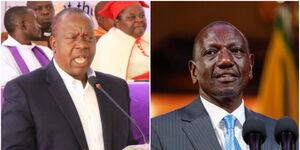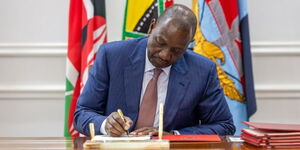The Ethics and Anti-Corruption Commission (EACC), in conjunction with other agencies, has opposed a bill from Mbeere North MP Geoffrey Kariuki Ruku seeking to delete from the law two corruption offences contained in the Anti-Corruption and Economic Crimes Act.
The lawmaker, who is serving his term under Democratic Party allied to the ruling Kenya Kwanza coalition, introduced the Anti-Corruption and Economic Crimes (Amendment) Bill, 2023, seeking to decriminalise sections of the Act including spending public funds in unplanned projects.
The bill seeks to repeal Section 45 (2) which criminalises a person's decision to use public funds to pay for substandard goods, goods not supplied and services not rendered.
It also criminalises engaging in a project using public funds without prior planning with the lawmaker arguing that the section should be better addressed through administrative action as opposed to criminal prosecution.
In their submissions to the National Assembly’s Justice and Legal Affairs Committee (JLAC) on Thursday, EACC and three other agencies termed the bill retrogressive, dangerous and a backward step in the fight against corruption.
They argued that the two sections exist to protect public funds from embezzlement and to enforce accountability among the public officials involved in the administration of public resources.
"The commission opposes the bill on the ground that decriminalising failure to follow procurement procedures undermines Article 227 of the Constitution, which provides for fairness, equity, transparency and cost-effectiveness in the procurement of public goods and services," EACC argued.
Other entities opposed to the bill are the Office of the Attorney General (AG), the Office of the Director of Public Prosecutions (ODPP) and Transparency International Kenya (TI-Kenya).
The Office of the Attorney General headed by Justin Muturi argued that the proposed repeal contradicted the institution's anti-corruption policy.
"By removing (the sections), the proposed amendment removes procurement fraud and malpractices from the ambit of corruption and economic crimes," Muturi wrote in documents tabled before JLAC and obtained by Kenyans.co.ke.
"As a result, officers who misappropriate public funds through procurement will not be subject to the provisions calling for the suspension of public officers charged with corruption and economic crimes."
The same sentiments were also expressed by Director of Public Prosecutions Renson Ingonga who argued that the creation of the offence sought to protect the government of Kenya from potential legal actions.
"The Constitution requires public money to be used in a prudent and responsible way. The test of prudence and responsibility can only be measured against established rules and procedures which can be audited," Ingonga posed.
Ruku Justification
The lawmaker had argued that the Constitutional change strengthened the fight against corruption by removing undue criminalisation of procurement flaws which in his view could be adequately dealt with through administrative action.












